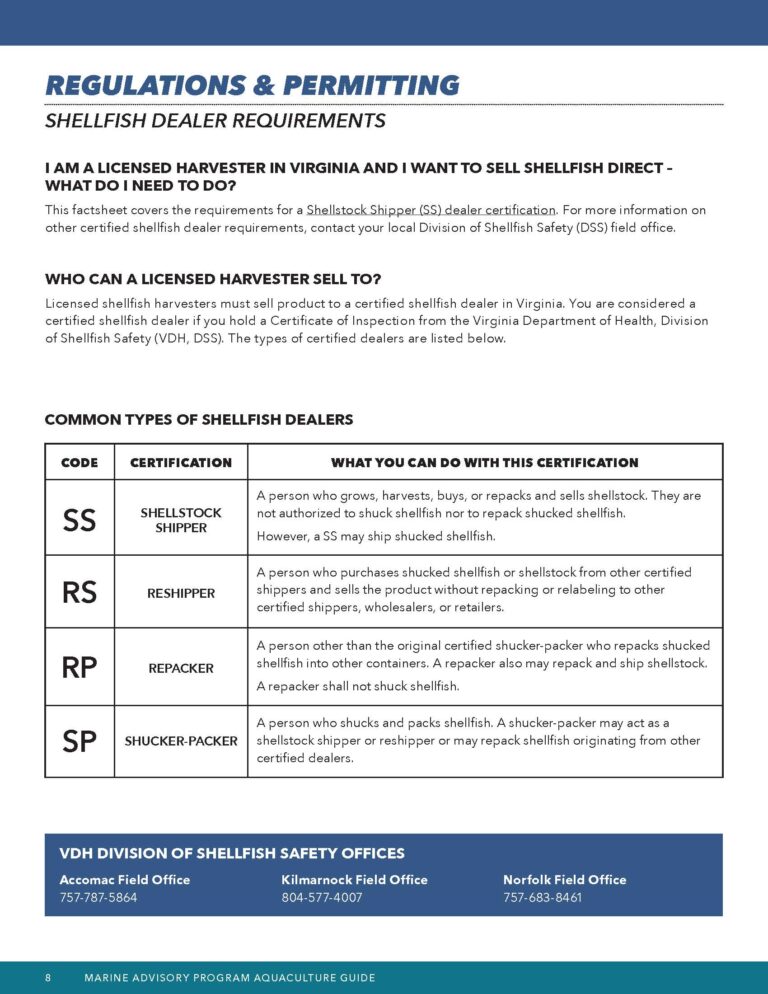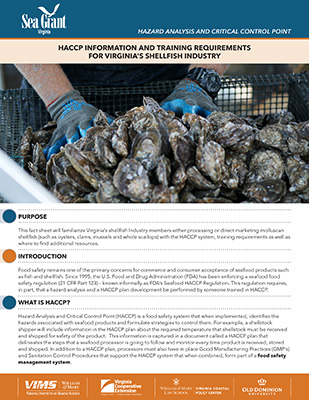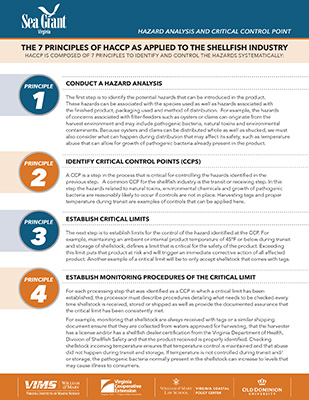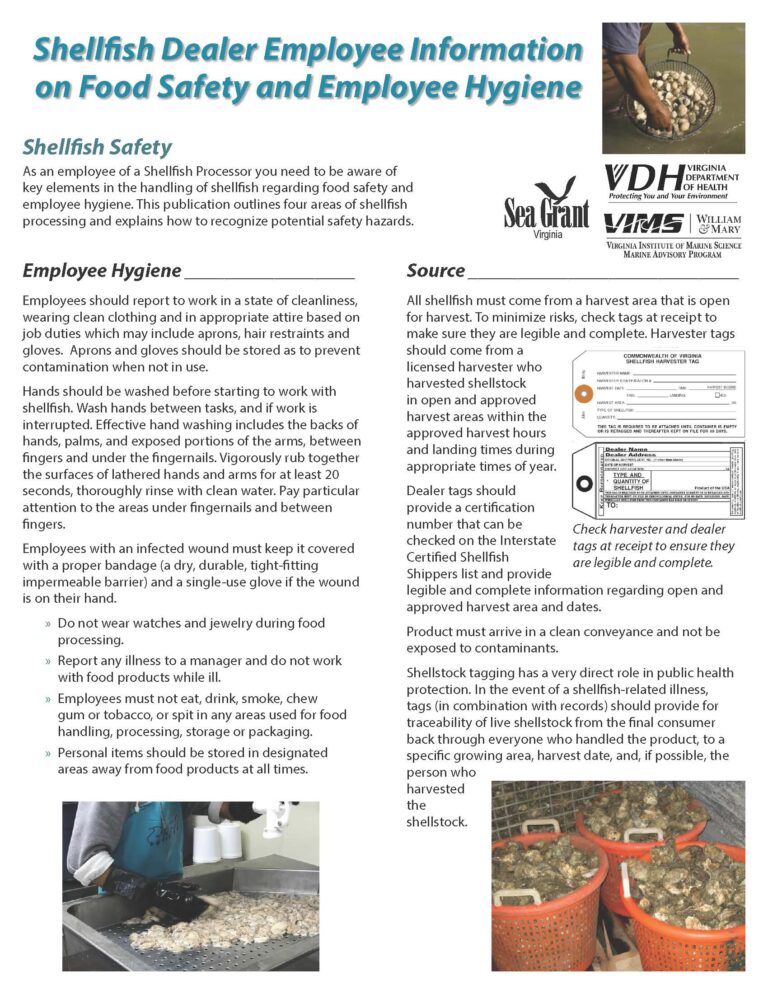VDH DSS REQUIREMENTS
The Virginia Department of Health (VDH) Division of Shellfish Safety and Waterborne Hazards (DSS) determine which shellfish growing areas are safe for harvest and regulate post-harvest processing and handling of shellfish.
CLASSIFICATION OF SHELLFISH GROWING AREAS
(DSS) determines if waters should be open or closed for the harvesting of shellfish. DSS makes these determinations by complying with regulations within the FDA’s National Shellfish Sanitation Program (NSSP). NSSP is a water-based program intended to promote the safe harvesting, handling, and shipping of shellfish for human consumption both within and across state lines. For an overview of the VDH DSS growing area classification program, please watch this video.
WHY?
Bivalves are filter feeders and can accumulate hazards, such as bacteria, viruses, heavy metals, or toxic substances, in their tissues as they pump water through their gills to breathe and feed. While these hazards don’t harm the shellfish, they can cause illnesses in humans when shellfish are consumed raw or undercooked. NSSP’s water classifications, which are used by DSS, are as follows: approved, conditionally approved, restricted, and prohibited. Shellfish can be safely consumed if harvested in an approved (open) growing area, or in a conditionally approved area providing the temporary closure guidance is followed.
For additional information on these classifications and how to check the status of a growing area to make sure shellfish are safe to harvest, please visit the links below:
- Table of water classification descriptions for National (NSSP) and Virginia
- Video – Overview of the VDH DSS growing area classification program
- Video – Conditional classifications – what they are, what they mean, and how they change
- Video tutorial on how to check the status of your growing area
- Why it’s important and How to check the status of your growing area
- NSSP model ordinance for federal classification descriptions
DETERMINING GROWING AREA CLASSIFICATIONS
DSS determines which classification to use for shellfish harvesting waters in Virginia by conducting shoreline surveys and seawater sampling.
Shoreline surveys are meant to identify potential land-based sources of direct pollution into the water, such as wastewater treatment facilities, marinas, an area with a failing septic system, or areas where livestock are entering the waterway. Intense sanitary shoreline surveys are conducted every 12 years to determine these potential point source locations, identify pollutant types, and determine the concentration within the water.
Seawater sampling is conducted to assess if pollution exists at values above the national threshold in waters that are not directly affected by sources of direct pollution. Shellfish harvesting waters in Virginia are grouped into 101 “Growing Areas” by DSS. Within these growing areas, there are more than 2,500 sampling stations. Each sampling station is sampled 6-9 times per year and water samples are analyzed for fecal bacteria. Formal evaluations of shellfish growing areas are conducted annually using systematic random sampling.
For a more detailed explanation of systematic random sampling, watch this video from VDH DSS.
Questions?
Contact DSS: Adam Wood (804-577-4007) or Daniel Powell (804-864-7480)
CERTIFICATION OF POST-HARVEST PROCESSING AND HANDLING OF SHELLFISH
All licensed shellfish harvesters must sell product to a certified shellfish dealer. You are considered a certified shellfish dealer if you hold a Certificate of Inspection (COI) from the Virginia Department of Health, Division of Shellfish Safety and Waterborne Hazards (DSS). Additionally, anyone that buys shellfish from Virginia and processes them in anyway, either by shucking, repacking, retagging, relabeling, or reshipping, must receive a COI. Types of certified shellfish dealers range from the more simple handling of shellstock to the more complex shucker-packer certification. Certification requirements are outlined in the National Shellfish Sanitation Program Model Ordinance (NSSP MO) and Virginia Code 12VAC5-150. All states must participate in the NSSP in order to safely harvest, handle, and ship bivalve molluscan shellfish interstate for consumption.
SHELLFISH DEALER CONSIDERATIONS
The first step before purchasing equipment or constructing your shellfish processing area, is PLANNING. Map out your process from start to finish – from the harvest and landing to washing and grading – to transport and final sale. Next, COMMUNICATE your plan with your local DSS field office. DSS will assign you a Shellfish Specialist to provide you with application materials and ensure your plans are in compliance with current regulations. It’s important to keep in mind that you may be subject to additional regulation, such as local zoning ordinances or other agency regulations depending on the scope of the proposed facility.
Considerations when planning to apply for a dealer certificate:
- How much product are you planning on harvesting?
- Who are you selling to? (restaurants, farm pick-up, online, etc.)
- Are you grading on shore or at the harvest site?
- Where will you source your water for washing harvested shellfish?
- Do you have facilities to refrigerate all your product?
- Do you have restroom facilities available onsite?
- How are you planning on transporting the product?
SHELLFISH DEALER REQUIREMENTS
VDH DSS is responsible for certifying dealers in Virginia and detailed information can be found on the VDH DSS website. Certification requires 1) an onsite inspection, 2) a HACCP plan and trained employees, and 3) ongoing compliance. After initial inspection, and each year following, if compliance is maintained, the dealer will receive their COI, get assigned a state certification number (VAXXXXSS), and be listed on the Interstate Certified Shellfish Shippers List (ICSSL). Harvesters may only sell shellfish to, and retail stores and restaurants may only receive shellfish from, sources listed on the ICSSL.
- Link to Fact Sheet on Shellstock Shipper (SS) Dealer Certification Requirements
- Note -Shellstock Shippers can take a 1 day HACCP course offered locally by DSS as opposed to the full, 3-day Seafood HACCP course. Contact Sarah Good (VDH Plant Program Manager) to sign up for the 1-day HACCP class Sarah.Good@vdh.virginia.gov / Central Office 804-864-7480
NEW CONSTRUCTION OR MODIFICATIONS OF A PROCESSING FACILITY – Certified dealers will need to contact the local DSS field office if there are any changes to the processing plan. Such as, where shellfish is processed (a new grading location or building, for example) or how (new refrigeration methods, or transport, for example). It’s important to keep in mind that you will likely be subject to additional regulation, such as local zoning ordinances or other agency regulations depending on the scope of new construction




